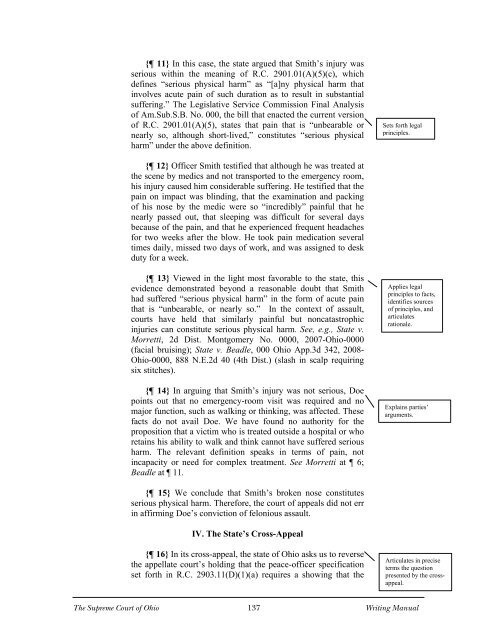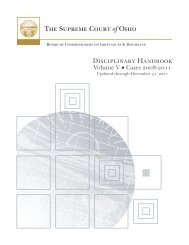WRITING MANUAL - Supreme Court - State of Ohio
WRITING MANUAL - Supreme Court - State of Ohio
WRITING MANUAL - Supreme Court - State of Ohio
You also want an ePaper? Increase the reach of your titles
YUMPU automatically turns print PDFs into web optimized ePapers that Google loves.
{ 11} In this case, the state argued that Smith’s injury was<br />
serious within the meaning <strong>of</strong> R.C. 2901.01(A)(5)(c), which<br />
defines “serious physical harm” as “[a]ny physical harm that<br />
involves acute pain <strong>of</strong> such duration as to result in substantial<br />
suffering.” The Legislative Service Commission Final Analysis<br />
<strong>of</strong> Am.Sub.S.B. No. 000, the bill that enacted the current version<br />
<strong>of</strong> R.C. 2901.01(A)(5), states that pain that is “unbearable or<br />
nearly so, although short-lived,” constitutes “serious physical<br />
harm” under the above definition.<br />
Sets forth legal<br />
principles.<br />
{ 12} Officer Smith testified that although he was treated at<br />
the scene by medics and not transported to the emergency room,<br />
his injury caused him considerable suffering. He testified that the<br />
pain on impact was blinding, that the examination and packing<br />
<strong>of</strong> his nose by the medic were so “incredibly” painful that he<br />
nearly passed out, that sleeping was difficult for several days<br />
because <strong>of</strong> the pain, and that he experienced frequent headaches<br />
for two weeks after the blow. He took pain medication several<br />
times daily, missed two days <strong>of</strong> work, and was assigned to desk<br />
duty for a week.<br />
{ 13} Viewed in the light most favorable to the state, this<br />
evidence demonstrated beyond a reasonable doubt that Smith<br />
had suffered “serious physical harm” in the form <strong>of</strong> acute pain<br />
that is “unbearable, or nearly so.” In the context <strong>of</strong> assault,<br />
courts have held that similarly painful but noncatastrophic<br />
injuries can constitute serious physical harm. See, e.g., <strong>State</strong> v.<br />
Morretti, 2d Dist. Montgomery No. 0000, 2007-<strong>Ohio</strong>-0000<br />
(facial bruising); <strong>State</strong> v. Beadle, 000 <strong>Ohio</strong> App.3d 342, 2008-<br />
<strong>Ohio</strong>-0000, 888 N.E.2d 40 (4th Dist.) (slash in scalp requiring<br />
six stitches).<br />
{ 14} In arguing that Smith’s injury was not serious, Doe<br />
points out that no emergency-room visit was required and no<br />
major function, such as walking or thinking, was affected. These<br />
facts do not avail Doe. We have found no authority for the<br />
proposition that a victim who is treated outside a hospital or who<br />
retains his ability to walk and think cannot have suffered serious<br />
harm. The relevant definition speaks in terms <strong>of</strong> pain, not<br />
incapacity or need for complex treatment. See Morretti at 6;<br />
Beadle at 11.<br />
Applies legal<br />
principles to facts,<br />
identifies sources<br />
<strong>of</strong> principles, and<br />
articulates<br />
rationale.<br />
Explains parties’<br />
arguments.<br />
{ 15} We conclude that Smith’s broken nose constitutes<br />
serious physical harm. Therefore, the court <strong>of</strong> appeals did not err<br />
in affirming Doe’s conviction <strong>of</strong> felonious assault.<br />
IV. The <strong>State</strong>’s Cross-Appeal<br />
{ 16} In its cross-appeal, the state <strong>of</strong> <strong>Ohio</strong> asks us to reverse<br />
the appellate court’s holding that the peace-<strong>of</strong>ficer specification<br />
set forth in R.C. 2903.11(D)(1)(a) requires a showing that the<br />
Articulates in precise<br />
terms the question<br />
presented by the crossappeal.<br />
The <strong>Supreme</strong> <strong>Court</strong> <strong>of</strong> <strong>Ohio</strong> 137 Writing Manual
















